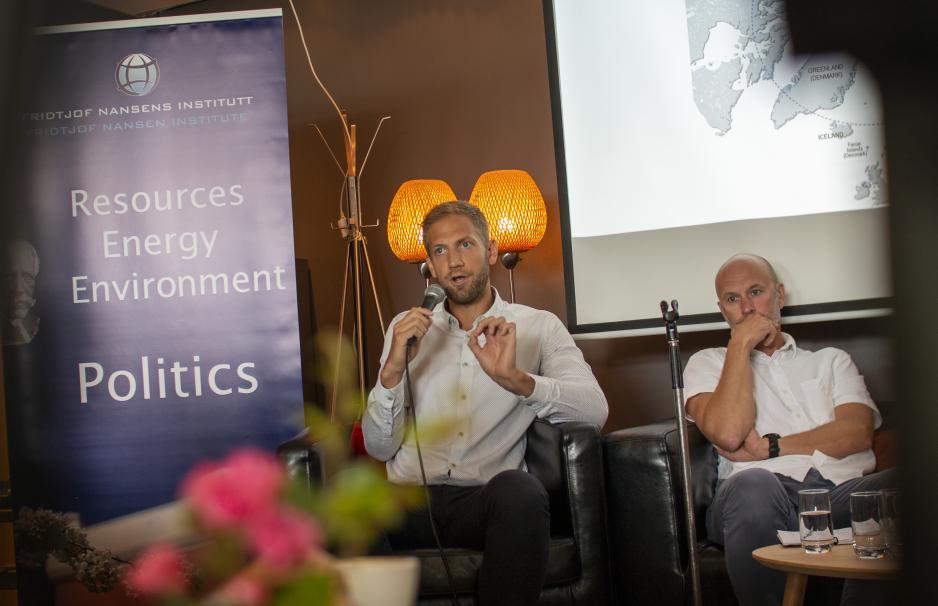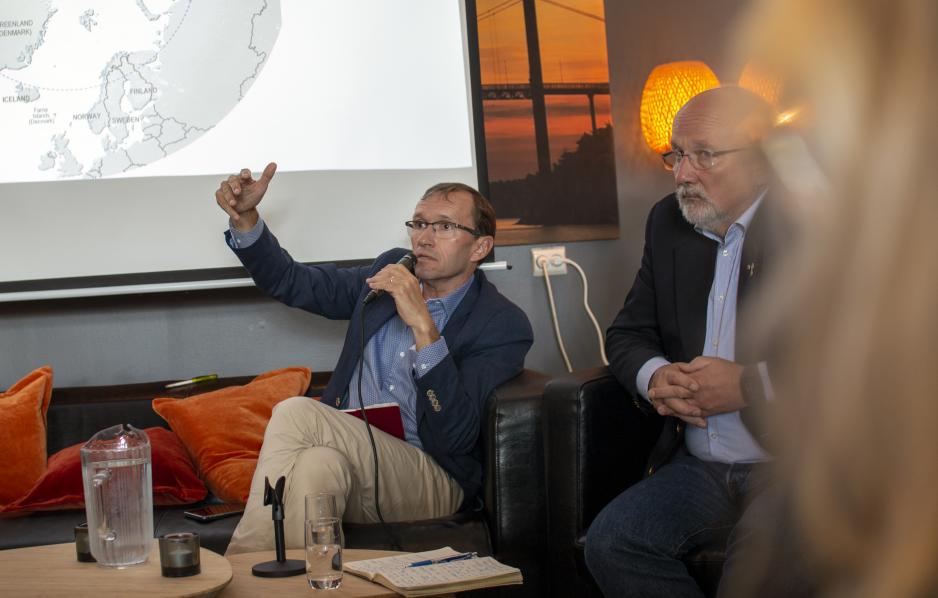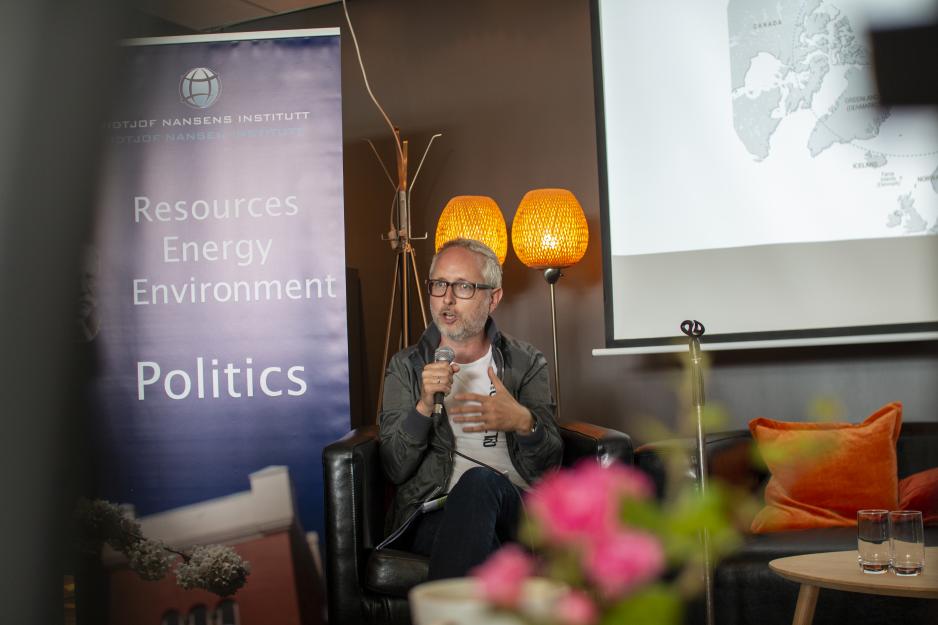Big Politics Enter the Arctic Suspicions, Conspiracy Theories and Conflicting Strategies Cause Trouble

Julie Wilhelmsen, researcher at the Norwegian Institute of International Affairs (NUPI). Photo: Amund Trellevik
Big politics have entered the Arctic. However, the Arctic states have conflicting strategies and threaten cooperation in the region. We must stop guessing and start listening, argues NUPI researcher Julie Wilhelmsen.
ARENDAL: The room is bulging when GRID Arendal (GRIDA) and the Fridtjof Nansen Institute (FNI) head off the Arendal Week’s High North Marathon with a debate about whether or not Norway is prepared for increased interest in the Arctic and our own High North.
A group of FNI researchers as well as a NUPI researcher introduced the debate talking about the respective interests, claims and desires the USA, Russia, China and Norway have in the Arctic.
A place to confront China
Andreas Østhagen, who recently wrote an op-ed about this issue in High North News (Norwegian only), points out that to the US Trump administration, the Arctic is more of an arena on which to confront China than an area of strategic interest.
- Obama placed the Arctic on the agenda, however, that was mainly because of climate change. He a.o. managed to secure a ban on oil- and gas exploration in parts of Alaska. With Trump, however, we see a shift. He has reopened these areas for petroleum exploration, including a nature reserve that has been protected for 40 years. As for US foreign policy, it is more of a rhetoric nature, Østhagen argues.
He then refers to Mike Pompeo’s infamous speech the day before the Arctic Council Ministerial Meeting last May.
- Defining the Arctic as an arena of conflict and increased tension is nothing new. What is new, is for Pompeo to choose to talk about this within a context of cooperation, as the Arctic Council is. However, I do not believe that it is about the Arctic; but rather about an area in which China can be confronted. That may leave Norway in a wedge between a rock and a hard place.
- The USA is our most important ally, though we are also dependent on having a good relationship with Russia. We have to balance these two, he continues.

Andreas Østhagen (left) and Svein Vigeland Rottem, both researchers at the Fridjof Nansen Institute. (Photo: Amund Trellevik)
Not listening is dangerous
Julie Wilhelmsen, researcher at the Norwegian Institute of International Affairs (NUPI) has spent the last few years listening to and reading everything the Russians say and write about Norway in the north, and the other way around. Hundreds of texts.
Her conclusion is that we are guessing too much.
- We have to stop guessing and start listening to what they say, because that will characterize their future pattern of action. At least they are reading everything that is stated from our side, she argues.
We have to stop guessing and start listening to what they say
She responds to Norwegian authorities' claiming not to understand the rationale behind increased Russian activity along the Norwegian coast.
- Stating that one does not see the rationale behind Russia behaving the way she does is not a very wise move. On the contrary, it may be dangerous to de-legitimize Russia's motives and not recognize these as a direct response to e.g. Trident Juncture, she says.
Wilhelmsen argues that Norwegian politicians should get better at listening to what the Russians say and calibrate their policy based on that.
- As early as in 2014, Russian Foreign Minister Sergey Lavrov stated that he feared a militarization of the Arctic and that Norway would invite the USA to closer cooperation in the region. Which has, in fact, happened. Increased Russian assertion is a response to a development she does not want and that she has warned against. It is defensive measures against NATO and the USA.
Blame each other
- Military exercises further south. How worrying is that?
- It is very worrying. During the past five years, we have seen an escalation as well as denials on both sides that this interplay is causing the escalation. And a tendency to blame each other, says the NUPI researcher.
In the texts Wilhelmsen studied, it is evident that Russia refers to itself as the largest Arctic state. The image provided of the Arctic is that of a region holding gigantic resources and a large economic development potential. And that Russia’s wealth will grow from this.
However, it is also important for the Russians to maintain a culture of cooperation among the Arctic states, according to Wilhelmsen.
- They are nevertheless also very concerned with public international law applying to all. The Russians feel that western states are pointing their finger at everyone else while they themselves go on breaking the law, she says in closing.
Regarded with suspicion
FNI researcher Gørild Heggelund has China as a special area of interest, and she argues that the country is regarded with suspicion and ascribed with motives it does not hold.
The starting point for China’s Arctic strategy is that it wants to contribute to finding solutions to climate changes – which also affect China, she says.
The starting point for China’s Arctic strategy is that it wants to contribute to finding solutions to climate changes
In China’s Arctic whitepaper from 2018, it refers to itself as a near-Arctic state, a phrase that has received widespread criticism, including from US Foreign Minister Mike Pompeo in Rovaniemi.
- In addition to climate and environment, China is concerned with potential future resources in the Arctic, for instance in fisheries. Its Arctic strategy says nothing about military presence, on the contrary; it wants to cooperate more with the Arctic states in order to preserve and protect the Arctic, she says and closes:
- China is increasingly involved on the international stage and has its interest, like any other country. I believe many of the conspiracy theories come from its being a very large country with a regime we of the West are not entirely comfortable with.
Not a “Clondyke”
Svein Vigeland Rottem, who is also a FNI researcher as well as author of two books about the Arctic Council, introduces by pointing out that there is much and good international cooperation in the High North, and he refutes the idea of the Arctic as a “Clondyke”:
- Arctic cooperation largely happens in two arenas; the UN Law of the Seas, which is the “Bible” of the Foreign Ministry, applies to the High North. And the Arctic is an ocean, which means that the UN Law of the Sea applies, which Norway has taken painful measures to communicate, he says.
However, with a new US administration the climate for cooperation in the Arctic Council is disturbed.
The other arena is the Arctic Council, which is described by all Arctic states as perhaps the most important international cooperation body of them all.
- However, with a new US administration the climate for cooperation in the Arctic Council is disturbed. Finding projects on which to agree becomes vital, as well as having stable people working with the Arctic Council from the Ministry of Foreign Affairs’ side, securing continuity in these efforts, Rottem says.

From the left: Espen Barth Eide, Labor MP, and Jørgen Bergrav, former Head of Regional Command for Northern Norway. (Photo: Amund Trellevik)
Very worried
Espen Barth Eide, former Defense and Foreign Minister (Labor) was key in shaping the Norwegian High North Policy. He was a.o. present during the difficult meeting in Kiruna in 2013, when China was awarded observer status at the Arctic Council.
- Generally speaking, it is important to notice what China is doing in the world. At the same time, both Norway and Russia have an interest in its committing to respecting the UNCLOS, he says.
Bård Vegar Solhjell’s largest worry is how the USA and the West will relate to China in the future.
- There is little disagreement that China is involved with some things we cannot support. However, we must be able to be factual and critical thereof while also promoting cooperation. Everything does not have to be placed in a US/China conflict context, he emphasizes and continues:
- The fact is that we are totally dependent on China. China is the most important country in the world to solve the global climate crisis.
China is the most important country in the world to solve the global climate crisis.

Bård Vegar Solhjell, Secretary-General of WWF Norway. (Photo: Amund Trellevik)
Because that is what is at the top of the WWF Norway Secretary-General’s agenda: How climate changes will affect the region.
- I am very worried. We have to understand how incredibly vital climate and environment will be for the next decade. Increased temperatures will alter the Arctic quite dramatically, even if we were to reach the global climate goals. I believe that climate changes and the battle for natural resources will constitute the key framework for the Arctic in the coming years.
Investments must be related to profits
Jørgen Berggrav is Rear Admiral and Chair of the Association of Norwegian Reserve Officers. He is a former Head of Regional Command Northern Norway, but emphasizes that he is speaking as a private individual.
- The way I see it, the challenges are related to Russia having its largest military hub on the Kola peninsula. Weapons and sensor technology reach further, which in turn leads to an increased need for presence in our immediate neighborhood. On both sides, he says in introduction.
Melting sea ice in the Arctic makes passages that were formerly inaccessible due to ice open up. At the same time, there are disagreements about the right of navigating in and through these passages, at least on the Russian and Canadian side.
Norway is acquiring every expensive equipment and we must make sure we get our money’s worth.
- This requires a larger degree of surveillance, though the best would be if as many as possible of the surveillance units were Norwegian. We cannot have planes on the ground or vessels not navigating due to staff shortage, he says.
Somewhat prepared
- So, are we sufficiently prepared for the threat image in the High North?
- As a starting point, Russia’s attacking Norway in the north is out of the question. The increased tension has more to do with interaction dynamics, Wilhelmsen says.
Barth Eide argues that we are better prepared than we were just a few years ago:
We are well prepared for the current situation image, though if there were to be a significant increase in activity, we’ll have a huge problem.
- Yet less prepared than we should be. We are well prepared for the current situation image, though if there were to be a significant increase in activity, we’ll have a huge problem.
Berggrav sees no reason to believe that the Arctic’s strategic importance will decrease.
- It is important to think about cooperation, though also about presence of relevant forces.
This article was originally published in Norwegian and has been translated by HNN's Elisabeth Bergquist.
